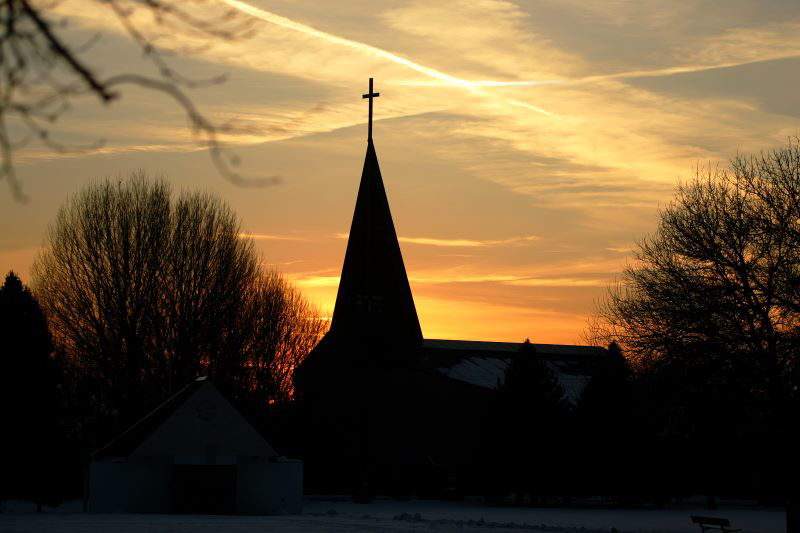The Ultimate Christmas Miracle
Sign up for a six month free
trial of The Stand Magazine!
Every December, the familiar trappings of Christmas emerge from storage to transform homes, churches, and neighborhoods. These holiday symbols represent something far greater than candy canes and snowmen. Beyond the nostalgia lies a world-changing event — the invasion of God upon enemy territory.
Christ’s birth may have seemed a silent night in sleepy Bethlehem. But the cosmic plane shuddered with the impact of the Divine invasion of rebellious earth. Humanity languished in active treason against their Creator. Not one soul, however virtuous, could evade the contagion of sin. “All we like sheep have gone astray,” Scripture declares (Isaiah 53:6).
Upon this bleak stage, a thread of ancient promise blazed into blinding reality. The Divine Lion threw back His mighty jaws to roar. The Prince of Heaven landed on hostile ground. Emmanuel, God with us, took on the form of an infant boy.
Had people grasped the magnitude of this, they would have reacted in terror. But the angel spoke words of peace as he announced Christ’s birth to the poor shepherds: “Behold, I bring you good news of great joy!”
The birth of Christ took place in humble surroundings: a baby wrapped in cloths and cradled in a manger. Do not miss the irony. This helpless child was the anointed Savior of the world, the Desire of Nations, the rightful Ruler of the earth. The multitude of angels could not contain themselves. Their song shattered the peaceful night. “Glory to God in the highest, and on earth peace, goodwill toward men!” (Luke 2:14).
At this moment, the darkness began to retreat, and dawn reached eagerly for mankind. Man’s struggle with sin would continue for a time, but for now, all creation celebrated Jesus’ first coming in humility and grace.
The Reason for the Incarnation
Christmas marks what theologians term the incarnation – God made flesh. As John declares, “The Word became flesh and dwelt among us” (John 1:14). The union of God with mortal human flesh is a miracle unlike any other and holds profound significance for believers, both spiritually and physically. The incarnation, the focal point of Christmas, is a central pillar of the Christian faith. Without it, all our hope for eternity collapses.
Imagine taking the energy, glory, and substance of all the stars in our galaxy and condensing them into a single grain of sand. That falls so short of the reality of the incarnation of Christ. All of who God is, in His omnipotence, omniscience, infinity, and Godship, all contained in one man, Christ Jesus.
Why? What possibly motivated God to stoop into stinking swaddling clothes in a forgotten stable? It was for our salvation.
“For God did not send his Son into the world to condemn the world, but that the world through Him might be saved” (John 3:17).
But why require the incarnation to save humanity? Couldn’t the Pharisees just intensify their law-keeping? What difference would a baby have upon the maze of religion already hedging the Jews? Everything. Only as one of us could the perfect sacrifice be offered to atone for human rebellion. No angel would suffice. It must be a man to redeem mankind. But not merely a man – a flawless, sinless man. So, the sinless God became a man born under the law. As Paul explains, “God sent forth His son, born of a woman, born under the law, to redeem those who were under the law...” (Galatians 4:4-5).
This is the great exchange, the glorious transaction of Christmas. The Author of Life assumed our humanity, our weakness, and frailty that we might partake of His love and share His spiritual riches.
Holding Fast to the Incarnation
In the early church, a false teaching arose and distorted the full meaning of Christ’s incarnation. Gnostic philosophy held that physical matter is innately corrupt while spirit is pure. Release from our evil physical shells was the path to salvation. What value a holy God could find in mingling with a material world in the incarnation baffled the Gnostics. At best, such a notion seemed absurd, at worst, repulsive. And so, the Gnostics denied it altogether and echoes from this ancient heresy whisper still today. It requires little effort to dismiss the flesh as unimportant. In the opinion of many, our physical bodies amount to nothing but an embarrassing appendage God intends to destroy. When we die, our spirits will transition into a vague eternal existence while the mortal husk rots. At most, the body serves as an expendable capsule for the true life of an ethereal soul.
Does Scripture support this perspective? Do our earthly bodies occupy a bleak parenthesis between the disembodied purity before and after mortal existence? Does God intend to scrub His eternal kingdom clean of the atoms, cells, and synapses comprising who we are?
Return to the beginning of beginnings in Genesis. By His Word alone, the Maker sculpted from nothingness stars and seas and rocks and rivers. Mankind could never improve on His handiwork. This world pulses with God’s glory despite bearing the wounds of human sin. And its destiny? God proclaims, “I am making everything new!” (Rev 21:5, NIV). The original earth finds redemption, not replacement. It is cleansed and transformed into a new heavens and new earth.
And who shall roam this renewed realm? We shall, not as disembodied spirits but as resurrected humans who have reclaimed physical glory. As Paul writes, “[Jesus] will transform our lowly body that it may be conformed to His glorious body” (Phil 3:21).
The incarnation of Jesus, which we celebrate at Christmas, stamps the Divine seal upon the promises of resurrection – that God still loves His creation and will not see a speck of it claimed in victory by sin and death.
The Eternal Incarnation
At this very moment, enthroned in heaven, reigns the God-man – Jesus Christ, in real human flesh. His heart still beats with the pulse of earthly blood once shed upon a cross. The eternal Word wears the physical scars of temporal suffering. Our Creator chose to permanently bind Himself to the dust He created. He remains one of us for all the ages yet to unfold.
We struggle to grasp this. God the Son confines Himself within measurable dimensions. He is made of muscles, bones, and ligaments. He has two human hands – human hands most likely calloused from working wood with a hammer and saw and certainly scarred by nails. His feet are worn by long walks from His thirty-three years traveling Israel. He probably has brown eyes and brown hair and takes after His mother, Mary, in looks. There is nothing ghostly, illusionary, or ethereal about the Man on Heaven’s throne. If you touched Him, you would feel like a real living human.
The incarnation and resurrection of Jesus are bookends that change everything about how we view our present earthly lives, our deaths, and our eternal lives to come.
If God deemed the body too worthless for redemption, He could simply create newly minted vessels for housing our souls in heaven. Instead, He promises to raise the perishable bodies we now possess into a state of imperishable glory (1 Cor 15:42-45). The weary flesh in which we suffer sickness, frustrations, and sin will rise renewed for deathless existence.
Living Between Two Advents
The baby born to redeem creation lies at the center of Christmas nostalgia and imagery. But that is only half the story – the baby will return as a conquering King.
Christ became like us at the first advent that we might become like Him at the second. “Beloved, now we are children of God; and it has not yet been revealed what we shall be, but we know that when He is revealed, we shall be like Him, for we shall see Him as He is” (1 John 3:2).
We now wait for the restoration of all things when the divine Bridegroom returns for His bride. There will be no hint of sin or sorrow to dampen the joy of that reunion. Our weak bodies will take on His everlasting strength. Our disease and affliction will be replaced by His wholeness. His immortality will conquer our dying.
But in the meantime, allow the miracle of the incarnation to change how you live now. Tend and steward your body and the rest of creation as soon-to-be trophies of grace. Keep yourself pure from sinful indulgences and cultivate a body ready and able to carry out the will of God as you sit at your table with friends and family this Christmas, taste and see afresh the undeserved goodness of God the Son who waits to enjoy a feast with you at the wedding supper of the Lamb.

Sign up for a free six-month trial of
The Stand Magazine!
Sign up for free to receive notable blogs delivered to your email weekly.



















